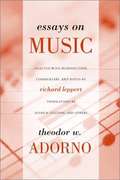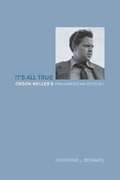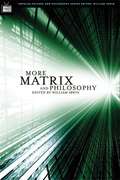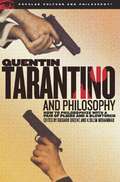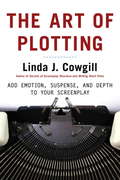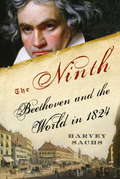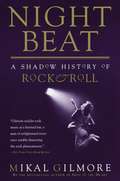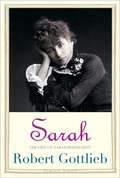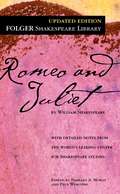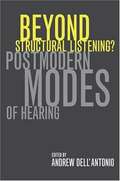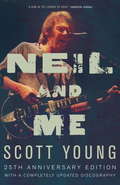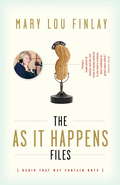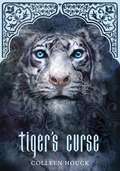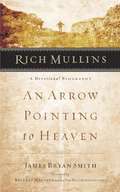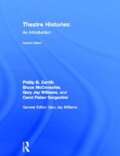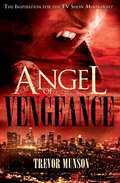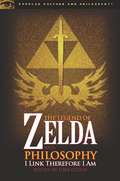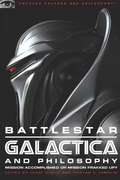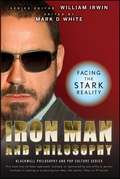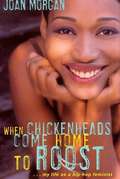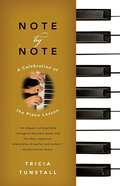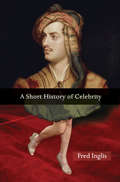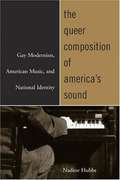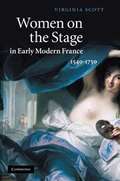- Table View
- List View
Essays on Music
by Theodor W. Adorno Richard D. Leppert Susan H. GillespieThis unique volume includes twenty-seven essays on music by Theodor W. Adorno, nearly half of which are translated into English for the first time, together with an expansive introduction, commentary, and notes by musicologist Richard Leppert.
It's All True: Orson Welles's Pan-American Odyssey
by Catherine L. BenamouCatherine Benamou synthesizes a wealth of new and little-known source material gathered on two continents, including interviews with key participants, to present a compelling original view of the film "It's All True," shot in Mexico and Brazil between 1941 and 1942 and its historical significance.
More Matrix and Philosophy: Revolutions and Reloaded Decoded
by William IrwinMostly American scholars of philosophy offer their insights into the trilogy of Matrix movies as a single entity, through the first section engages the critical bashing of the two sequels. Freedom and reality, global philosophy unplugged, and social and political issues are the other themes. Among specific topics are the Prozac of the people, the music of the future, the cosmological journey of Neo, and whether Morpheus is Black.
Quentin Tarantino and Philosophy: How to Philosophize with a Pair of Pliers and a Blowtorch
by Richard Greene K. Silem MohammadFifteen essays presented by Greene (philosophy, Weber State U) and Mohammad (language, literature, and philosophy, Southern Oregon U) explore a range of philosophical questions through engagements with the films of director Quentin Tarantino. Topics include a Nietzschean reading of Reservoir Dogs, the ethics of revenge and mercy and the recitation of the biblical passage Ezekiel 25:17 in Pulp Fiction, the ethics of vengeance in Kill Bill, knowledge and pragmatism in Jackie Brown, transformations of time and causality in Pulp Fiction, Kill Bill as Oedipal play, and elements of Buddhist philosophy in Kill Bill.
The Art of Plotting: How to Add Emotion, Excitement, and Depth to Your Writing
by Linda J. CowgillPlot must be as much about the emotions of the characters as it is about the events of the story. That's the message of The Art of Plotting, which teaches screenwriters how to integrate plot, characterization, and exposition to make stories compelling. Using examples from recent and classic movies, author Linda J. Cowgill demonstrates how the plot springs naturally from the characters--and how that technique makes audiences connect with the story on a more intimate level. Easy exercises reveal common plot problems and help writers overcome them.
The Ninth: Beethoven and the World in 1824
by Harvey Sachs"All men become brothers . . . Be embraced, ye millions!" The Ninth Symphony, a symbol of freedom and joy, was Beethoven's mightiest attempt to help humanity find its way from darkness to light, from chaos to peace. Yet the work was born in a repressive era, with terrified Bourbons, Hapsburgs, and Romanovs using every means at their disposal to squelch populist rumblings in the wake of the French Revolution and Napoleon's wars. Ironically, the premiere of this hymn to universal brotherhood took place in Vienna, the capital of a nation that Metternich was turning into the first modern police state.The Ninth's unveiling, on May 7, 1824, was the most significant artistic event of the year, and the work remains one of the most precedent-shattering and influential compositions in the history of music--a reference point and inspiration that resonates even today. But in The Ninth, eminent music historian Harvey Sachs demonstrates that Beethoven was not alone in his discontent with the state of the world. Lord Byron died in 1824 during an attempt to free Greece from the domination of the Ottoman empire; Delacroix painted a masterpiece in support of that same cause; Pushkin, suffering at the hands of an autocratic czar, began to draft his anti-authoritarian play Boris Godunov; and Stendhal and Heine wrote works that mocked conventional ways of thinking.The Ninth Symphony was so unorthodox that it amazed and confused listeners at its premiere--described by Sachs in vibrant detail--yet it became a standard for subsequent generations of creative artists, and its composer came to embody the Romantic cult of genius. In this unconventional, provocative new book, Beethoven's masterwork becomes a prism through which we may view the politics, aesthetics, and overall climate of the era.Part biography, part history, part memoir, The Ninth brilliantly explores the intricacies of Beethoven's last symphony--how it brought forth the power of the individual while celebrating the collective spirit of humanity. From the Hardcover edition.
Night Beat: A Shadow History of Rock and Roll
by Mikal GilmoreFew journalists have staked a territory as definitively and passionately as Mikal Gilmore in his twenty-year career writing about rock and roll. Now, for the first time, this collection gathers his cultural criticism, interviews, reviews, and assorted musings. Beginning with Elvis and the birth of rock and roll, Gilmore traces the seismic changes in America as its youth responded to the postwar economic and political climate. He hears in the lyrics of Bob Dylan and Jim Morrison the voices of unrest and fervor, and charts the rise and fall of punk in brilliant essays on Lou Reed, The Sex Pistols, and The Clash. Mikal Gilmore describes Bruce Springsteen's America and the problem of Michael Jackson. And like no one else, Gilmore listens to the lone voices: Al Green, Marianne Faithfull, Sinead O'Connor, Frank Sinatra. Four decades of American life are observed through the inimitable lens of rock and roll, and through the provocative and intelligent voice of one of the most committed chroniclers of American music, and its powerful expressions of love, soul, politics, and redemption.
Sarah: The Life of Sarah Bernhardt
by Robert GottliebSarah is the first English-language biography to appear in decades. Brilliantly, it tracks the trajectory through which an illegitimate and scandalous daughter of a courtesan transformed herself into the most famous actress who ever lived, and into a national icon, a symbol of France.
The Tragedy of Romeo and Juliet (The Folger Shakespeare Library)
by William Shakespeare Barbara A. Mowat Paul WerstinePresents the original text of Shakespeare's play side by side with a modern version, discusses the author and the theater of his time, and provides quizzes and other study activities.
Beyond Structural Listening? Postmodern Modes of Hearing
by Andrew Dell'AntonioIn a highly influential essay, Rose Rosengard Subotnik critiques "structural listening" as an attempt to situate musical meaning solely within the unfolding of the musical structure itself. The authors of this volume, prominent young music historians and theorists writing on repertories ranging from Beethoven to MTV, take up Subotnik's challenge in what is likely to be one of musical scholarship's intellectual touchstones for many years to come. Original, innovative, and sophisticated, their essays explore not only the implications of the "structural listening" model but also the alternative listening strategies that have developed in specific communities, often in response to twentieth-century Western music.
Neil and Me
by Scott YoungScott Young chronicles his son's early years in and around Toronto and Winnipeg and his rise from journeyman, musician to superstar in the 1960s and 1970s. The frequent occasions when Scott and Neil's paths have crossed - from backstage meetings and family get-togethers to a sold-out appearance at Carnegie Hall - give a fascinating portrait of an enigmatic star.From the Paperback edition.
The As It Happens Files
by Mary Lou FinlayIn the tradition of Peter Gzowski's The Morningside Papers comes a book that celebrates the great stories and personalities behind As It Happens.For eight years, Mary Lou Finlay had the pleasure of being the co-host of one of CBC Radio's most enduring institutions. On any given day she and Barbara Budd interviewed people on subjects varying from the Air India investigation to a man who invented a suit that would withstand an attack from a grizzly bear to a cheese-rolling contest in Cheshire. The As It Happens Files gives us the great stories - the hilarious eccentrics, the audience favourites, the poignant moments - that make up, for many Canadians some of the fondest, most vivid memories of the last decade.
Tiger's Curse (Tiger's Curse #1)
by Colleen HouckThe last thing teenager Kelsey Hayes thought she'd be doing over the summer was meeting Ren, a mysterious white tiger and cursed Indian prince! When she learns she alone can break the Tiger's curse, Kelsey's life is turned upside-down.
Rich Mullins: An Arrow Pointing to Heaven
by James Bryan SmithDuring his life, Rich Mullins challenged the sensibilities of what it means to follow Jesus in today's world, and now in his death, he challenges all to build upon his legacy of joy, compassion, brokenness, unblinking honesty, and wonder of an Awesome God.
Cultural Moves: African Americans and the Politics of Representation
by Herman S. GrayHerman Gray takes a sweeping look at black popular culture over the past decade to explore culture's role in the push for black political power and social recognition. In a series of linked essays, he finds that black artists, scholars, musicians, and others have been instrumental in reconfiguring social and cultural life in the United States and he provocatively asks how black culture can now move beyond a preoccupation with inclusion and representation.
Theatre Histories: An Introduction (2nd edition)
by Phillip B. Zarrilli Bruce A. Mcconachie Carol Fisher Sorgenfrei Gary Jay WilliamsThis new edition of the innovative and widely acclaimed Theatre Histories: An Introduction offers overviews of theatre and drama in many world cultures and periods together with case studies demonstrating the methods and interpretive approaches used by today's theatre historians. Completely revised and renewed in color, enhancements and new material include: A full-color text design with added timelines to each opening section A wealth of new color illustrations to help convey the vitality of performances described New case studies on African, Asian, and Western subjects A new chapter on modernism, and updated and expanded chapters and part introductions Fuller definitions of terms and concepts throughout in a new glossary A re-designed support website offering links to new audio-visual resources, expanded bibliographies, approaches to teaching theatre and performance history, discussion questions relating to case studies and an online glossary.
Angel of Vengeance
by Trevor O. MunsonThe novel that inspired the TV series Moonlight puts a twist on the classic Dracula vampire tale and blends it with Chandler hardboiled P.I. detective fiction.LA-based P.I. and vampire Mick Angel has been hired by a beautiful red-headed burlesque dancer to find her missing sister. But the apparently simple case of a teenage runaway is soon complicated by drug dealers, persistent cops, murder, and Mick's own past. Mick must learn the hard way what every vampire should know - nothing stays buried for ever, especially not the past.
The Legend of Zelda and Philosophy: I Link Therefore I Am
by Luke CuddyStudents of philosophy and of video games, of course, but also of literature, education, media, communication, and other fields examine a particular video game as a gateway into pondering the significance of the entire realm. Among the topics are critical thinking in the gaming and real worlds, the hero with a thousand hearts, slave morality and master swords, Zelda as a communication game, temporality, Hyrule's green and pleasant land, Zeldathustra, the Triforce and the doctrine of the mean, the legend of feminism, and getting to know the world next door.
Battlestar Galactica and Philosophy: Mission Accomplished or Mission Frakked Up?
by Tristan D. Tamplin Josef SteiffIn this book for students in pop culture and philosophy, Steiff (film and video, Columbia College, Chicago) and Tamplin (philosophy) present 33 essays from scholars in philosophy, media studies, screenwriting, and military intelligence, among other fields, dissecting the science fiction TV series Battlestar Galactica and its movie spin-offs in terms of the philosophical questions they confront. The contributors demonstrate how the show tackles such issues as who counts as human, the implications of the killing of an intelligent non-human, democracy and bad decisions, occupation or resistance in war, the balancing of security and democracy, free will and determinism, and colonialism, among others.
Iron Man and Philosophy: Facing the Stark Reality
by Mark D. WhiteThe first look at the philosophy behind the Iron Man comics and movies, timed for the release of Iron Man 2 in March 2010. On the surface, Iron Man appears to be a straightforward superhero, another rich guy fighting crime with fancy gadgets. But beneath the shiny armor and flashy technology lies Tony Stark, brilliant inventor and eccentric playboy, struggling to balance his desires, addictions, and relationships with his duties as the Armored Avenger. Iron Man and Philosophy explores the many philosophical issues that emerge from the essential conflicts found in the decades of Iron Man stories in comics and movies. What kind of moral compass does Tony Stark have? Is Iron Man responsible for the death of Captain America after the Marvel Universe "Civil War"? Should people like Stark run the world? How does Tony's alcoholism impact his performance as Iron Man, and what does it say about moral character? Ultimately, what can Iron Man teach us about the role of technology in society? As absorbing as Iron Man comic books and movies, Iron Man and Philosophy: Gives you a new perspective on Iron Man characters, story lines, and themes Shows what philosophical heavy hitters such as Aristotle, Locke, and Heidegger can teach us about Tony Stark/Iron Man Considers issues such as addiction, personal responsibility, the use of technology, and the role of government Whether you've been reading the comic books for years or have gotten into Iron Man through the movies, Iron Man and Philosophy is a must-have companion for every fan.
When Chickenheads Come Home to Roost: My Life as a Hip-hop Feminist
by Joan MorganA new voice of the post-Civil Rights, post-feminist, post-soul generation has emerged which probes the complex issues facing African-American women today. The book is a decidedly intimate look into the life of the modern black woman.
Note by Note: A Celebration of the Piano Lesson
by Tricia TunstallIn this luminous book, Tricia Tunstall explores the enduring fascination of the piano lesson. Even as everything else about the world of music changes, the piano lesson retains its appeal. Drawing on her own lifelong experience as a student and teacher, Tunstall writes about the mysteries and delights of piano teaching and learning. What is it that happens in a piano lesson to make it such a durable ritual? In a world where music is heard more often on the telephone and in the elevator than in the concert hall, why does the piano lesson still have meaning in the lives of children? What does it matter whether one more child learns to play Bach's Minuet in G? Note by Note is in part a memoir in which Tunstall recalls her own childhood piano teachers and their influence. As she observes, the piano lesson is unlike the experience of being coached on an athletic team or taught in a classroom, in that it is a one-on-one, personal communication. Physically proximate, mutually concentrating on the transfer of a skill that is often arduous, complicated and frustrating, teacher and student occasionally experience breakthroughs-moments of joy when the student has learned something, mastered a musical passage or expressed a feeling through music. The relationship is not only one-way: teaching the piano is a lifelong endeavor of particular intensity and power. Anyone who has ever studied the piano-or wanted to-will cherish this gem of a book.
A Short History of Celebrity
by Fred InglisLove it or hate it, celebrity is one of the dominant features of modern life--and one of the least understood. Fred Inglis sets out to correct this problem in this entertaining and enlightening social history of modern celebrity, from eighteenth-century London to today's Hollywood. Vividly written and brimming with fascinating stories of figures whose lives mark important moments in the history of celebrity, this book explains how fame has changed over the past two-and-a-half centuries. Starting with the first modern celebrities in mid-eighteenth-century London, including Samuel Johnson and the Prince Regent, the book traces the changing nature of celebrity and celebrities through the age of the Romantic hero, the European fin de siecle, and the Gilded Age in New York and Chicago. In the twentieth century, the book covers the Jazz Age, the rise of political celebrities such as Mussolini, Hitler, and Stalin, and the democratization of celebrity in the postwar decades, as actors, rock stars, and sports heroes became the leading celebrities. Arguing that celebrity is a mirror reflecting some of the worst as well as some of the best aspects of modern history itself, Inglis considers how the lives of the rich and famous provide not only entertainment but also social cohesion and, like morality plays, examples of what--and what not--to do. This book will interest anyone who is curious about the history that lies behind one of the great preoccupations of our lives.
The Queer Composition of America's Sound: Gay Modernists, American Music, and National Identity
by Nadine HubbsNadine Hubbs shows how a gifted group of Manhattan-based gay composers were pivotal in creating a distinctive "American sound" and in the process served as architects of modern American identity. Focusing on a talented circle that included Aaron Copland, Virgil Thomson, Leonard Bernstein, Marc Blitzstein, Paul Bowles, David Diamond, and Ned Rorem, The Queer Composition of America's Sound homes in on the role of these artists' self-identification.
Women on the Stage in Early Modern France: 1540-1750
by Virginia ScottFocusing on actresses in France during the early modern period, Virginia Scott examines how the stereotype of the actress has been constructed. The study then moves beyond that stereotype to detail the reality of the personal and artistic lives of women on the French stage, from the almost unknown Marie Ferr_ - who signed a contract for 12 livres a year in 1545 to perform the 'antiquailles de Rome or other histories, moralities, farces, and acrobatics' in the provinces - to the queens of the eighteenth-century Paris stage, whose 'adventures' have overshadowed their artistic triumphs. The book also investigates the ways in which actresses made invaluable contributions to the development of the French theatre in the seventeenth and eighteenth centuries, and looks at the 'afterlives' of such women as Armande B_jart, Marquise Du Parc, Charlotte Desmares, Adrienne Lecouvreur, and Hippolyte Clairon in biographies, plays, and films.
